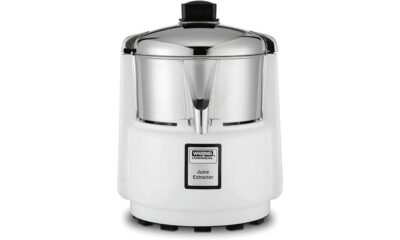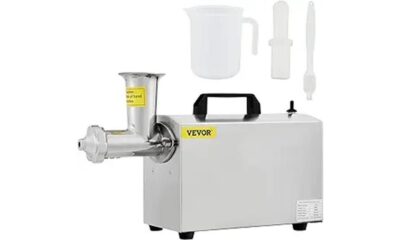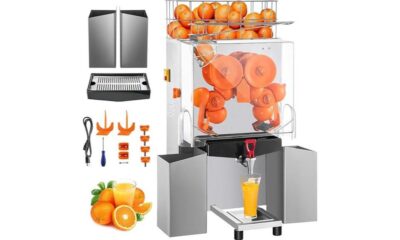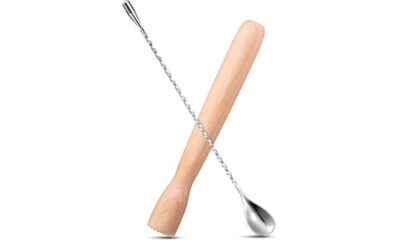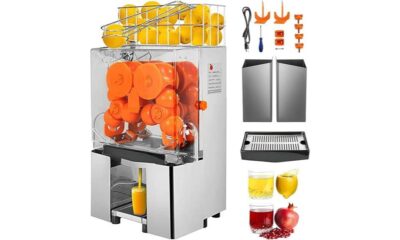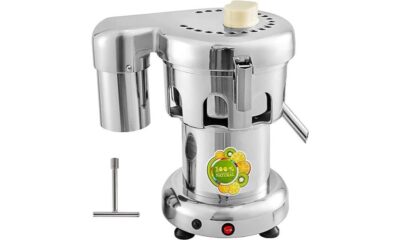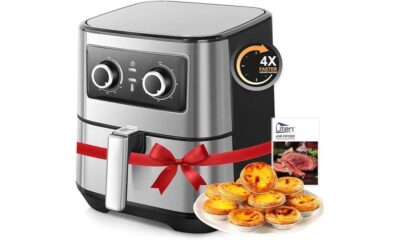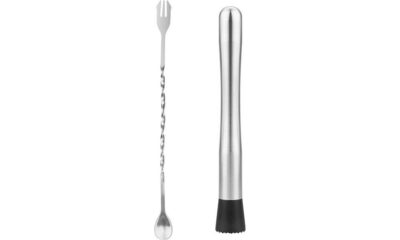Coffee Roasting
What Is Micro Coffee Roasting
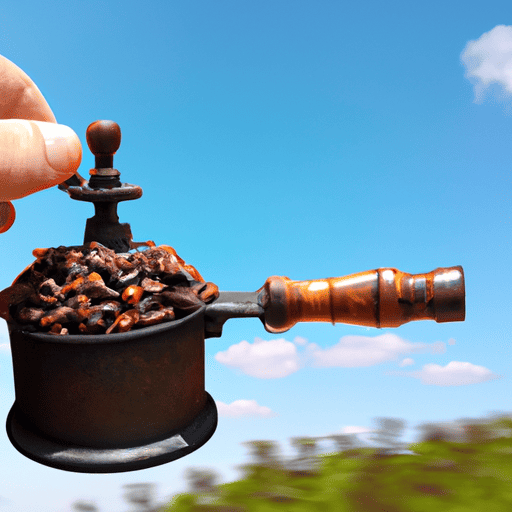
I have always been a coffee lover, but it wasn’t until I discovered micro coffee roasting that I truly fell in love with the art and science of coffee making.
Micro coffee roasting, also known as artisanal coffee roasting, is the process of roasting small batches of coffee beans to perfection to bring out their unique flavors and aromas. It’s a craft that requires skill, patience, and a deep understanding of coffee beans and their flavor profiles.
Micro coffee roasting is not a new concept, but it has gained popularity in recent years as coffee enthusiasts seek out higher quality and more flavorful coffee. As a coffee lover, I was drawn to micro roasting because it offered a way to explore the many different flavors and nuances of coffee that I had never experienced before.
In this article, I will share my knowledge and passion for micro coffee roasting, including its definition and background, the process of roasting coffee, and tips for those who want to try micro roasting at home.
Key Takeaways
- Micro coffee roasting is a specialized process that requires skill, attention to detail, and precise temperature control to bring out the unique flavors and aromas of coffee beans.
- This method prioritizes quality over mass production and allows for experimentation and creativity in the roasting process.
- Micro roasted coffee offers unique and exciting flavors that cannot be found in mass-produced coffee, but it can be more expensive and time-consuming to produce.
- Proper equipment and bean selection are crucial for achieving a successful and consistent roast, and different brewing methods can bring out different flavor profiles in the coffee.
Definition and Background of Micro Coffee Roasting
So, you’re probably wondering what micro coffee roasting is and where it all started. Well, let me tell you, micro coffee roasting is the process of roasting small batches of specialty coffee beans to produce unique and high-quality flavors. This trend has been gaining popularity in the coffee industry in recent years, but it actually has a long history and evolution.
The art of micro coffee roasting can be traced back to the 1970s in the United States, when the specialty coffee movement began. During this time, coffee enthusiasts started to experiment with different roasting techniques and flavors, leading to the birth of micro roasting. This allowed coffee roasters to focus on small batches of high-quality beans, and to control the entire roasting process from start to finish.
As a result, micro roasted coffee emerged as a specialty product, offering unique and exciting flavors that couldn’t be found in mass-produced coffee. With this in mind, let’s delve deeper into the art of micro coffee roasting.
The Art of Micro Coffee Roasting
I absolutely love the art of micro coffee roasting. It’s all about craftsmanship and attention to detail, focusing on quality over quantity.
Every batch is a labor of love, and experimentation and creativity play a huge role in the process.
It’s not just about roasting coffee beans, it’s about creating a unique and flavorful experience for coffee lovers everywhere.
Craftsmanship and Attention to Detail
Craftsmanship and attention to detail are key components of micro coffee roasting, with each bean receiving individualized care and consideration throughout the roasting process. At our micro roastery, we take great pride in the craftsmanship that goes into every batch of coffee we roast. From carefully selecting the best quality green beans to meticulously monitoring the roast, every step is taken with precision and care.
To illustrate the attention to detail that goes into micro coffee roasting, let’s take a look at the following table:
| Roasting Parameter | Key Factor | Importance |
|---|---|---|
| Roast Time | Flavor profile | Critical |
| Drum Speed | Heat distribution | High |
| Temperature | Roast level | Medium |
As you can see, every aspect of the roasting process is carefully considered and managed to ensure that each bean is roasted to perfection. By focusing on the details, we are able to bring out the unique flavors and characteristics of each coffee bean, resulting in a truly exceptional cup of coffee. And that’s what sets micro coffee roasting apart from larger scale operations – the ability to craft a high-quality product with precision and care.
Quality over Quantity
When it comes to your cup of joe, you deserve a focus on quality over quantity, ensuring that every sip is a truly satisfying experience. This is why micro coffee roasters prioritize quality control and precise sourcing techniques.
Unlike larger coffee companies that prioritize mass production and profit, micro roasters take the time to carefully select high-quality, sustainable beans and roast them in small batches to ensure optimal flavor and freshness.
Quality control is a key aspect of micro coffee roasting. Micro roasters are committed to producing coffee that is consistently delicious and of the highest quality. To achieve this, they use a variety of techniques to ensure that each batch of coffee is roasted to perfection. This includes monitoring the temperature and time of the roast, as well as conducting taste tests to ensure that the coffee has the desired flavor profile.
By prioritizing quality over quantity, micro roasters are able to produce coffee that is truly exceptional and worthy of the most discerning coffee connoisseurs. This passion for quality is just one aspect of micro coffee roasting.
Next, we’ll explore how experimentation and creativity are also integral to this craft.
Experimentation and Creativity
Get ready to explore the exciting world of experimenting and getting creative with your coffee, where the possibilities are endless and your taste buds are in for a treat. One of the benefits of micro coffee roasting is the ability to dive into flavor exploration.
Different beans from different regions of the world have unique characteristics that can be brought out in the roasting process. By experimenting with different roast profiles, I can highlight specific flavor notes like chocolate, citrus, or even floral undertones. It’s like being a coffee alchemist, transforming raw beans into a delicious, complex beverage.
Roast experimentation is also a way to showcase your creativity and personal taste. I can try different roast levels, blending different beans, or even adding unique ingredients like cinnamon or vanilla. The possibilities are endless, and it’s a way to make a truly unique cup of coffee that reflects my individual style.
It’s also an opportunity to challenge myself and continue to learn about the nuances of coffee roasting. With every roast, I discover something new and exciting about the coffee I’m working with.
Now, let’s explore the benefits of micro coffee roasting further.
The Benefits of Micro Coffee Roasting
You’ll love the unique flavors and aromas that come with micro coffee roasting. As a micro roaster myself, I’ve discovered firsthand the many benefits of this process. For one, micro roasting allows for greater control over the roasting process, resulting in a more consistent and higher quality product. Additionally, micro roasting allows for experimentation and creativity, which leads to unique flavor profiles that can’t be found in mass-produced coffee.
But with any benefit comes challenges. One of the biggest challenges in micro roasting is the cost. Because micro roasters typically roast in smaller batches, the cost per pound of coffee can be higher than that of mass-produced coffee. Additionally, micro roasting requires a lot of time, attention to detail, and a deep understanding of the roasting process. However, for those who are passionate about coffee and committed to producing the highest quality product, the benefits of micro roasting far outweigh the challenges.
With its unique flavors and high quality, micro roasted coffee is truly a treat for the senses. But how exactly is this process achieved? Let’s dive into the process of micro coffee roasting and discover the art behind this delicious drink.
The Process of Micro Coffee Roasting
I hope you’re as excited as I am to dive deeper into micro coffee roasting! As we’ve already learned, there are countless benefits to this method of roasting, but let’s take a closer look at what the process actually entails.
First and foremost, temperature control is crucial when it comes to micro roasting. Unlike larger scale roasting methods, micro roasting allows for much more precise temperature control, which is essential in order to achieve the desired flavor profile. This means that the roaster must constantly monitor and adjust the temperature throughout the roasting process to ensure that the beans are roasted to perfection.
Another important aspect of micro coffee roasting is roasting for specific brewing methods. Different brewing methods require different levels of roast, so it’s important to understand the nuances of each method in order to roast the beans accordingly. For example, espresso requires a darker roast than drip coffee in order to achieve the strong, bold flavor that is characteristic of this brewing method.
By roasting specifically for each brewing method, micro roasters are able to create a truly unique and delicious cup of coffee.
Now, let’s move on to the next section where we’ll dive even deeper into understanding the flavor profile of coffee.
Understanding the Flavor Profile of Coffee
I find it fascinating how the process of roasting can have such a significant impact on the flavor profile of coffee.
From light to dark roasts, each level of roasting brings out different tasting notes and descriptions.
As a coffee enthusiast, I’m always curious about the factors that affect the flavor of my coffee. These factors include the origin of the beans, the altitude they were grown at, and the method of processing.
Understanding these factors can lead to a deeper appreciation and enjoyment of coffee.
The Impact of Roasting on Flavor
Roasting is like cooking, and just like cooking, the amount of heat and time spent on the beans will greatly affect the flavor of the coffee. Roasting techniques can vary from light to dark, and each level of roast will produce a different flavor profile. As a micro coffee roaster, I take great care in selecting the perfect roast for each type of bean to ensure that the unique flavors and aromas are highlighted.
Sensory analysis is a crucial part of the roasting process. As the beans roast, I use my senses to determine when they have reached their optimal point. This involves monitoring the color, smell, and sound of the beans as they roast. By carefully controlling the roasting process, I can bring out the best in each bean and create a coffee that is truly exceptional. With each roast, I strive to highlight the unique characteristics of the bean, whether it’s a fruity and acidic Ethiopian Yirgacheffe or a rich and chocolatey Sumatra Mandheling.
This attention to detail and commitment to quality allows me to create a truly exceptional cup of coffee for my customers. As I move into discussing tasting notes and descriptions, it’s important to note that the flavor profile of each roast is just the beginning of the story.
Tasting Notes and Descriptions
As I mentioned earlier, the roasting process plays a significant role in the flavor profile of coffee. Now let’s dive into the fun part – tasting and describing the flavors!
Tasting coffee is a sensory experience that involves using all five senses, and there are a variety of techniques to help us identify different flavors. One popular method is called cupping, where coffee is brewed in small cups and tasted in a specific order to highlight the nuances of each coffee.
When tasting coffee, it’s important to pay attention to the aroma, acidity, body, and aftertaste. Some people prefer bright, fruity coffees with high acidity, while others may prefer a more full-bodied and chocolatey flavor.
Tasting notes and descriptions are subjective and can vary from person to person. However, it’s important to develop your palate and be able to articulate what you taste in order to better understand your flavor preferences and make informed decisions when selecting coffee.
Moving on to our next topic, let’s explore the various factors that affect the flavor of coffee.
Factors that Affect Flavor
Let’s uncover the fascinating world of coffee flavor and the numerous factors that impact its taste and aroma. As a micro coffee roaster, it’s important to understand the variables that influence the final product. Two of the most critical factors are roasting duration and roasting temperature.
Roasting duration determines how dark the beans become and how much of their original flavor profile is retained. A shorter roast will produce a lighter, more acidic coffee, while a longer roast will create a darker, fuller-bodied coffee. Roasting temperature also affects the flavor profile. Lower temperatures result in a brighter, more acidic coffee, while higher temperatures produce a richer, more caramelized coffee. By adjusting both duration and temperature, roasters can create a wide range of flavor profiles to suit their customers’ preferences.
When it comes to micro coffee roasting, choosing the right beans is just as important as understanding the roasting process. So, let’s dive into the next section and explore the different types of beans that are ideal for micro roasting.
Choosing the Right Beans for Micro Roasting
When looking to start micro coffee roasting, it’s important to pick the perfect beans that will complement your desired roast profile. Bean selection is a crucial step in the process as it’s where you’ll determine the flavor characteristics of your coffee.
It’s important to consider the origin, type, and quality of the beans. Each origin and type of bean will have its unique flavor profile. For example, African beans are known for having fruity and floral notes, while South American beans are generally milder and have nutty or chocolatey flavors. Additionally, the quality of the beans will also impact the taste, so it’s essential to buy high-quality beans to ensure a smooth and consistent roast.
Roast level is another crucial factor to consider when selecting your beans. The roast level will determine the flavor profile of the coffee, with lighter roasts offering brighter and fruitier flavors, while darker roasts offer more robust and smoky tastes.
As a micro roaster, you have the flexibility to experiment with different roast levels to find the perfect taste for your coffee. It’s essential to understand the impact of different roast levels on the beans to achieve your desired flavor profile.
With the right beans and roast level, you’ll be on your way to producing a delicious cup of coffee. As you move forward in the process, you’ll need to consider what equipment and tools you’ll need to get started.
Equipment and Tools for Micro Roasting
Investing in the proper equipment and tools is crucial for achieving a successful and consistent roast when starting a micro roasting business. There are several key pieces of equipment that are necessary for the roasting process, including a roaster, a cooling tray, a scale, and a thermometer. Each piece plays an important role in ensuring that the beans are roasted to perfection and that the final product is of the highest quality.
In addition to the essential equipment, there are also various tools that can aid in the roasting process. These include a bean scoop, a timer, and a notebook for recording roasting techniques and bean selection. With the right equipment and tools, micro roasters can experiment with different roasting techniques and bean selections to create unique and delicious blends that will set them apart from the competition.
When it comes to home micro roasting, there are some important tips to keep in mind to ensure a successful roast.
Tips for Home Micro Roasting
When it comes to home micro roasting, choosing the right beans is crucial. I always make sure to select high-quality, specialty-grade beans that are fresh and have a distinct flavor profile.
Along with the beans, using the right equipment is essential in achieving the perfect roast. I recommend investing in a quality roaster and learning how to properly use it for consistent and delicious results.
Finally, don’t be afraid to experiment with different roasting times and temperatures to find the perfect balance that brings out the unique qualities of each bean. With a little practice and patience, anyone can become a skilled home micro roaster.
Choosing the Right Beans
Picking the perfect beans for your micro-roasting business can feel like a quest for the Holy Grail, but fear not, there are plenty of options out there to satisfy even the pickiest of coffee snobs. When choosing the right beans, consider the following:
-
Roasting levels – Some beans are better suited for certain roasting levels, so it’s important to select the right beans for your desired roast. For example, if you’re looking to create a light roast, Ethiopian beans may be a good choice, while a dark roast may require a Brazilian or Sumatran bean.
-
Origin selection – Different regions produce beans with unique characteristics, such as flavor, acidity, and body. Consider experimenting with beans from different origins to find the perfect flavor profile for your roasts.
-
Freshness – Freshness is key when it comes to coffee, so be sure to select beans that are as fresh as possible. Look for beans with a roast date within a few weeks of purchase, and avoid pre-ground beans, as they lose freshness quickly.
By carefully selecting the right beans, you can ensure that your micro-roasting business produces coffee that is both flavorful and unique. With the right ingredients, you’ll be on your way to creating a truly exceptional cup of coffee.
Now, let’s move on to the next step: using the right equipment.
Using the Right Equipment
To ensure the perfect cup of joe, you need to have the right equipment for the job. In micro coffee roasting, the equipment you use can make all the difference.
There are various roasting techniques, each requiring different types of equipment. For instance, some roasting machines have a drum that rotates the beans to ensure an even roast, while others use hot air to roast the beans.
Whatever type of equipment you choose, it’s important to maintain it properly to ensure that it lasts and works effectively. Equipment maintenance is crucial to the roasting process. Neglecting to clean and maintain your roasting equipment can cause it to break down, which can be frustrating and expensive.
Before roasting your next batch, take the time to clean and inspect your equipment. This will help ensure that your coffee beans are roasted to perfection every time. With the right equipment and proper maintenance, you’ll be able to experiment with roasting times and temperatures, which is the next step in the micro coffee roasting process.
Experimenting with Roasting Times and Temperatures
Now that I’ve got the right equipment and have maintained it properly, it’s time to start experimenting with different roasting techniques and temperatures to achieve the perfect flavor and aroma for my beans. Roasting is an art form that requires a lot of practice and patience. It’s not just about heating up the beans and waiting for them to turn brown. It’s about understanding the chemical reactions that happen during the roasting process and how they affect the beans’ taste and aroma.
To start my flavor experimentation, I’ll begin by roasting small batches of beans and adjusting the temperature and time as needed. I’ll keep track of my results in a notebook and make note of any changes I make to my roasting technique. It’s important to remember that each bean is unique, so what works for one type of bean may not work for another.
With time and practice, I’ll be able to create a signature roast that is uniquely my own.
Now, let’s move on to finding micro roasters and coffee shops that share my passion for coffee.
Finding Micro Roasters and Coffee Shops
When it comes to finding the best micro roasters and coffee shops, I always go for local options first. Not only do they offer unique blends and flavors, but they also support the community.
But if you don’t have any local options, there are plenty of online options to explore. Reviews and recommendations from other coffee enthusiasts can also help you narrow down your choices.
And if you’re looking for something really special, don’t be afraid to seek out specialty and rare coffees. Trust me, the extra effort is worth it for that perfect cup of coffee.
Local and Online Options
Local and online options are like two sides of the same coin when it comes to finding the perfect micro-roasted coffee. Local options offer the benefit of being able to physically visit a coffee shop or roaster, allowing you to experience the atmosphere and interact with the people behind the roast. This can also provide the opportunity to learn more about the roasting process and ask questions about the specific beans being used. Additionally, local options often source their beans from nearby farms, supporting local businesses and promoting sustainability.
On the other hand, online options provide the convenience of being able to order from the comfort of your own home and having the coffee shipped directly to you. This can be especially beneficial for those living in areas without access to local micro-roasters. Online options often have a wider variety of beans to choose from, allowing you to explore different flavor profiles and regions. However, it can be difficult to gauge the quality of the coffee without being able to taste it first.
When looking for the perfect micro-roasted coffee, both local and online options have their benefits and drawbacks. It’s important to weigh these factors and decide what is most important to you. But regardless of which option you choose, reading reviews and recommendations can be a helpful step in making your decision.
Reviews and Recommendations
Looking for the perfect cup of joe? Check out reviews and recommendations to help guide your search! When it comes to micro coffee roasting, it’s important to know the best practices and popular brands. Reading reviews from other coffee lovers can give you insight into the quality and taste of different roasts. Additionally, researching customer satisfaction can help you make an informed decision on which roaster to choose.
To make your search easier, I’ve compiled a table comparing different micro coffee roasters based on price and customer satisfaction. Keep in mind that while price is an important factor, it’s not always an indicator of quality. Some of the most expensive roasts may not be the best tasting, while some of the more affordable options may surprise you with their flavor. Take a look at the table below and use it as a starting point for your own research:
| Brand | Price Range | Customer Satisfaction |
|---|---|---|
| Blue Bottle Coffee | $16-$28 | 4.5/5 stars |
| Counter Culture Coffee | $14-$23 | 4/5 stars |
| Intelligentsia Coffee | $14-$22 | 4.5/5 stars |
| Stumptown Coffee Roasters | $14-$24 | 4/5 stars |
| Verve Coffee Roasters | $16-$26 | 4.5/5 stars |
Now that you have a better idea of what to look for in a micro coffee roaster and some popular brands to consider, let’s move on to exploring specialty and rare coffees.
Specialty and Rare Coffees
If you’re looking to indulge in a unique and exquisite coffee experience, specialty and rare coffees are like discovering a hidden gem in a sea of ordinary beans. These coffees are sourced from small, independent farms around the world that produce only a limited amount of high-quality beans.
The process of finding and sourcing these rare beans can be time-consuming and expensive, but the end result is a cup of coffee that is truly exceptional. Brewing techniques are also important when it comes to experiencing the full potential of these rare coffees.
Each type of bean requires its own unique brewing method to bring out its specific flavor profile. Some of these brewing methods include pour-over, French press, and siphon brewing. It’s important to experiment with different brewing techniques to find the one that best suits the coffee you’re brewing.
Overall, specialty and rare coffees offer a one-of-a-kind coffee experience that is worth seeking out for any true coffee lover.
Frequently Asked Questions
How does micro coffee roasting compare to commercial coffee roasting in terms of taste and quality?
In my experience, micro coffee roasting yields a more nuanced and complex flavor profile compared to commercial roasting. The attention to detail and quality analysis during the roasting process results in a superior taste that is unmatched.
Can you micro roast coffee beans using a regular home oven or do you need specialized equipment?
Did you know that 80% of coffee’s flavor is created during the roasting process? When it comes to micro roasting at home, you can use a regular oven but specialized equipment offers more consistency. Pros include customization and freshness, cons include cost and learning curve.
Is micro coffee roasting more expensive than buying pre-roasted coffee beans?
Pros of micro coffee roasting include fresher, higher quality coffee with more unique flavors. Cons may include a higher cost for specialized equipment and potentially less sustainable practices. Ethical considerations include supporting small businesses and fair trade practices.
How long does it take to master the art of micro coffee roasting?
Oh, it only takes a lifetime of practice to master the art of micro coffee roasting. But don’t worry, perfection is attainable. Patience is key, and the benefits are worth it.
Are there any health benefits associated with drinking micro roasted coffee?
I love drinking micro roasted coffee from specialty coffee shops because of the health benefits. The beans are roasted in small batches, ensuring maximum freshness and flavor. Plus, the high antioxidant content in coffee can help improve brain function and reduce the risk of chronic diseases.
Conclusion
In conclusion, I must say that micro coffee roasting is an art form that’s both complex and rewarding. It takes patience, skill, and a love for coffee to produce the perfect roast.
The process of micro roasting is not easy, but it’s worth it. The flavor profile that can be achieved through micro roasting is truly unique and can’t be found anywhere else.
If you’re looking to get into micro roasting, there are many resources available to you. Start by researching the different types of beans and the flavor profiles they offer. Find a good source for green coffee beans and invest in a quality roaster.
With time and practice, you’ll be able to create your own signature roast that’ll impress even the most discerning coffee aficionados. So, what’re you waiting for? Start your micro roasting journey today and discover the rich, complex flavors of coffee that you never knew existed.
Justin is a seasoned author, coffee and tea enthusiast, and an essential member of the Cappuccino Oracle team. With a keen appreciation for the complexities of coffee, coffee alternatives, and tea, Justin has dedicated his professional career to exploring these realms and sharing his insights with readers worldwide.
Justin’s immersion in the world of coffee, coffee alternatives, and tea began at a young age, kindling a passion that extended beyond mere consumption. This love for these beverages led him to combine his talent for writing with his devotion to coffee and tea, bringing him to Cappuccino Oracle as a dedicated author.
Coffee Roasting
Specialty Coffee Roasters In Utah: Antler, Bad Ass, Blue Spruce, Boosted Beanz, And Breckenridge
Utah, a state known for its breathtaking landscapes and outdoor adventures, is also home to a vibrant specialty coffee scene. Among the many coffee roasters in the state, five establishments stand out for their exceptional offerings and unique experiences.
Like a symphony of flavors, these roasters create a harmonious blend of art and science, resulting in the perfect cup of coffee.
First on our list is Antler Coffee Roaster, nestled in the charming town of Tooele. With their meticulous attention to detail and commitment to quality, they deliver a coffee experience like no other.
Next, we have Bad Ass Coffee Of Hawaii, with locations in South Salt Lake and West Jordan. Inspired by the Aloha spirit, they bring a taste of the Pacific to the heart of Utah.
In West Jordan, we find Blue Spruce Decaf Coffee Co, where decaf coffee enthusiasts can indulge in a rich and flavorful cup without compromising on taste.
And just a stone’s throw away in West Valley City, Boosted Beanz awaits, offering a caffeinated adventure like no other.
Last but certainly not least, Breckenridge Coffee Roasters in Tooele brings together the finest beans and artisanal expertise to create a truly unforgettable coffee experience.
Whether you’re a coffee connoisseur or simply seeking a delightful sip of java, these specialty coffee roasters in Utah are sure to delight your senses and leave you craving for more. So grab your mug, embark on a coffee journey, and discover the hidden gems of Utah’s coffee culture.
Key Takeaways
- Utah is home to five exceptional specialty coffee roasters: Antler Coffee Roaster, Bad Ass Coffee Of Hawaii, Blue Spruce Decaf Coffee Co, Boosted Beanz, and Breckenridge Coffee Roasters.
- Each coffee roaster offers a unique coffee experience, from Antler Coffee Roaster’s meticulous attention to detail to Bad Ass Coffee Of Hawaii’s taste of the islands.
- Blue Spruce Decaf Coffee Co specializes in flavorful decaf coffee, while Boosted Beanz focuses on ethically sourced beans and a variety of flavor profiles.
- Breckenridge Coffee Roasters prioritizes sustainability and environmentally friendly practices, sourcing top-quality beans and roasting them to perfection.
Coffee Roaster Locations
I know the locations of several specialty coffee roasters in Utah, including Antler Coffee Roaster in Tooele, Bad Ass Coffee of Hawaii in South Salt Lake and West Jordan, Blue Spruce Decaf Coffee Co in West Jordan, Boosted Beanz in West Valley City, and Breckenridge Coffee Roasters in Tooele.
Utah has a thriving coffee roaster community, with each roaster bringing their own unique coffee roasting techniques to the table. Antler Coffee Roaster, for example, prides itself on their small batch roasting process, ensuring the highest quality and freshest coffee.
Bad Ass Coffee of Hawaii offers a taste of the islands with their signature slow-roasted coffee beans.
Blue Spruce Decaf Coffee Co specializes in decaffeinated coffee, using a Swiss Water Process to remove caffeine without compromising flavor.
Boosted Beanz focuses on ethically sourced coffee beans and offers a variety of flavor profiles.
Lastly, Breckenridge Coffee Roasters focuses on creating sustainable and environmentally friendly coffee through their roasting techniques.
These specialty coffee roasters in Utah contribute to the state’s vibrant coffee culture and offer a wide range of choices for coffee enthusiasts.
Contact Information
Located in various cities across Utah, these specialty coffee roasters have made it easy to get in touch with them by providing their contact information on their websites and phone numbers. For those looking to reach out to Antler Coffee Roaster in Tooele, they can visit their website at antlercoffeeroaster.com or call them at 661-304-8005.
Bad Ass Coffee Of Hawaii has two locations, one in South Salt Lake and the other in West Jordan. Their website, badasscoffee.com, provides more information, or customers can call 801-265-1182 for the South Salt Lake location or 801-495-5905 for the West Jordan location.
Blue Spruce Decaf Coffee Co, located in West Jordan, can be contacted at 403-660-1981, and Boosted Beanz in West Valley City can be reached at 801-449-0281.
Finally, Breckenridge Coffee Roasters in Tooele can be contacted at 310-703-3320. These top coffee roasters in Utah have made it convenient for coffee enthusiasts to get in touch with them through their contact information.
Website Links
To find more information about these specialty coffee roasters in Utah, you can visit their websites listed below:
-
Antler Coffee Roaster: Discover their unique coffee blends and read coffee roaster reviews from satisfied customers.
-
Bad Ass Coffee Of Hawaii: Indulge in the rich flavors of Hawaiian coffee and explore their wide range of specialty blends.
-
Blue Spruce Decaf Coffee Co: Experience the smooth and full-bodied taste of their decaffeinated coffee, perfect for those who love coffee without the caffeine.
-
Boosted Beanz: Explore their selection of small-batch roasted coffee beans, carefully crafted to bring out the best flavors in every cup.
-
Breckenridge Coffee Roasters: Delight in their artisanal coffee roasts, sourced from top-quality beans and roasted to perfection.
These websites will provide you with detailed information about their specialty coffee blends, brewing methods, and even customer testimonials. Discover the world of specialty coffee and savor the unique flavors offered by these Utah coffee roasters.
Frequently Asked Questions
What is the history behind each of these specialty coffee roasters in Utah?
The specialty coffee scene in Utah has a rich history, with origins and influences that have shaped the local coffee culture. Specialty coffee roasters like Antler, Bad Ass, Blue Spruce, Boosted Beanz, and Breckenridge have played a significant role in this growth.
Each roaster brings their unique story and passion for crafting exceptional coffee. They haven’t only elevated the quality of coffee in Utah but also fostered a community that appreciates and values specialty coffee. Their dedication has had a lasting impact on the local coffee culture.
How do these coffee roasters source their beans and ensure quality?
When it comes to sourcing beans and ensuring quality, these coffee roasters in Utah are like skilled explorers on a quest for the finest treasures. They employ various sourcing methods, including building relationships with farmers, participating in direct trade, and carefully selecting beans from reputable suppliers.
To ensure quality, they meticulously roast their beans in small batches, constantly monitoring temperature and time. Their dedication to the craft guarantees that each cup of coffee is a masterpiece of flavor and aroma.
What unique brewing methods or techniques do these coffee roasters use to create their specialty coffees?
Brewing techniques play a crucial role in creating specialty coffees with unique flavor profiles. Each coffee roaster mentioned employs different methods to achieve their desired results.
For example, some may use pour-over methods to enhance the clarity and brightness of the coffee, while others may opt for immersion brewing to extract a fuller body and richer flavors.
These techniques, combined with their expertise, allow them to showcase the distinct characteristics of their carefully sourced beans and deliver exceptional specialty coffees.
Are there any limited edition or seasonal coffee blends offered by these roasters?
Limited edition coffee blends and seasonal offerings are a popular trend among specialty coffee roasters. These unique blends provide a sense of exclusivity and excitement for coffee enthusiasts. Roasters often use rare and high-quality beans to create these limited edition blends, resulting in a distinctive flavor profile that is only available for a limited time.
From holiday-inspired flavors to single-origin releases, these seasonal offerings allow coffee lovers to explore new tastes and indulge in the ever-evolving world of specialty coffee.
Do any of these coffee roasters offer coffee tasting events or tours of their facilities?
Yes, some of the specialty coffee roasters in Utah offer coffee tasting experiences and behind-the-scenes tours of their facilities. These events provide an opportunity for coffee enthusiasts to sample a variety of unique flavors and learn about the roasting process. Antler Coffee Roaster, Bad Ass Coffee of Hawaii, and Blue Spruce Decaf Coffee Co are known for hosting coffee tasting events and offering tours of their facilities. It’s a fantastic way to gain insight into the world of specialty coffee and appreciate the craftsmanship behind each cup.
Arf, an author and an innovative enthusiast of coffee, coffee alternatives, and tea, plays a crucial role as a contributor to the esteemed Cappuccino Oracle platform. Renowned for his curiosity and passion for these captivating beverages, Arf has carved out a unique space for himself in the world of exploration and writing. He realized that coffee, coffee alternatives, and tea are not mere drinks to keep one awake, but universes of flavors and stories waiting to be explored.
Arf’s articles for Cappuccino Oracle blend meticulous research with personal experiences, providing readers with an in-depth understanding of various types of coffee, coffee alternatives, and tea, along with their unique characteristics, cultures, and histories. His honest reviews and engaging narratives guide readers on their own journeys, helping them discover their preferences and find their perfect brew.
Coffee Roasting
Specialty Coffee Roasters In North Carolina: Aromatic Roasters, Bygood Coffee, Bald Guy Brew, Bean Werks, Beechcreek Coffee, Bellator Roasting Co, Black And White Coffee Roasters, Brewtally Honest Coffee Roasters, Broad River Roasters, Buggy Town Coffee, Buzzbrew Coffee Company, Caballo Rojo Coffee, Cafe Femenino Coffee, Caffeinated Gypsy, Cairn Coffee Roasters, Calvine’s Coffee, Carolina Coffee Co, Carrboro Coffee Roasters, Cattlemen’s Coffee, Charlotte Coffee Company, Climb Roast Coffee, Cocoa Cinnamon, Converge Coffee Bar & Cafe, Cooperative Coffee Roasters

Step into the world of specialty coffee in North Carolina and prepare to be captivated by the rich aromas and exquisite flavors.
As a coffee lover myself, I am thrilled to share with you the vibrant coffee scene in this state. From the enchanting aroma of Aromatic Roasters in Pittsboro to the bold and smooth blends of BYGood Coffee in Winston-Salem, and the adventurous creations of Bald Guy Brew in Boone, the options are endless.
Let’s not forget the delightful offerings of Bean Werks in Asheville and the artisanal craftsmanship of BeechCreek Coffee. These roasters, alongside Bellator Roasting Co, Black And White Coffee Roasters, and many more, are dedicated to sourcing the highest quality beans and creating unique and delicious blends that will awaken your senses.
Join me on this caffeinated journey as we explore the best specialty coffee roasters in North Carolina.
Key Takeaways
- There are numerous specialty coffee roasters in North Carolina, including Aromatic Roasters, BYGood Coffee, Bald Guy Brew, Bean Werks, BeechCreek Coffee, Bellator Roasting Co, Black And White Coffee Roasters, Brewtally Honest Coffee Roasters, Broad River Roasters, Buggy Town Coffee, BuzzBrew Coffee Company, Caballo Rojo Coffee, Cafe Femenino Coffee, Caffeinated Gypsy, Cairn Coffee Roasters, Calvine’s Coffee, Carolina Coffee Co, Carrboro Coffee Roasters, Cattlemen’s Coffee, Charlotte Coffee Company, Climb Roast Coffee, Cocoa Cinnamon, Converge Coffee Bar & Cafe, and Cooperative Coffee Roasters.
- Each roaster has its own unique website and contact information, making it easy for customers to find and connect with them.
- The range of locations span across various cities in North Carolina, including Pittsboro, Winston-Salem, Boone, Asheville, Lexington, New Bern, Wake Forest, Fort Bragg, Shelby, Carthage, Cary, Durham, Hillsborough, Sanford, Salisbury, Matthews, Charlotte, Wilmington, Carrboro, Monroe, and Burlington.
- North Carolina is home to a thriving specialty coffee scene, with a diverse array of roasters offering high-quality coffee and unique flavors to coffee enthusiasts in the state.
What is it?
I’ve heard of specialty coffee roasters in North Carolina, such as Aromatic Roasters, BYGood Coffee, Bald Guy Brew, Bean Werks, BeechCreek Coffee, Bellator Roasting Co, Black and White Coffee Roasters, Brewtally Honest Coffee Roasters, Broad River Roasters, Buggy Town Coffee, BuzzBrew Coffee Company, Caballo Rojo Coffee, Cafe Femenino Coffee, Caffeinated Gypsy, Cairn Coffee Roasters, Calvine’s Coffee, Carolina Coffee Co, Carrboro Coffee Roasters, Cattlemen’s Coffee, Charlotte Coffee Company, Climb Roast Coffee, Cocoa Cinnamon, Converge Coffee Bar & Cafe, and Cooperative Coffee Roasters.
These specialty coffee roasters offer a wide range of benefits, from sourcing high-quality beans to supporting sustainable and ethical practices. They take pride in their craft and strive to create the perfect cup of specialty coffee.
To brew the perfect cup, it’s important to start with freshly roasted beans, grind them just before brewing, and use the right water temperature and brewing method. Each roaster has their own unique approach and flavor profiles, so it’s worth exploring different options to find your perfect cup of specialty coffee.
Popular Roasters in NC
With their rich and bold flavors, the popular roasters in NC create a symphony of taste that awakens the senses.
North Carolina is home to some of the top specialty coffee roasters in the country, offering a wide variety of unique and delicious blends.
Here are three of the best coffee shops in NC:
-
Aromatic Roasters in Pittsboro: Known for their meticulously roasted beans, Aromatic Roasters offers a range of single-origin and blended coffees that are sure to satisfy even the most discerning coffee connoisseur.
-
Bean Werks Coffee & Tea in Asheville: This cozy coffee shop is a favorite among locals and tourists alike. Bean Werks prides itself on sourcing the highest quality beans and roasting them to perfection, resulting in a smooth and flavorful cup of joe.
-
Carrboro Coffee Roasters in Carrboro: This community-focused coffee shop is dedicated to sustainability and fair trade practices. Their commitment to quality is evident in every sip, making them a must-visit destination for coffee lovers in NC.
Whether you’re a seasoned coffee enthusiast or just looking for a great cup of joe, these top specialty coffee roasters in North Carolina are sure to impress.
Contact Information
For contact information, you can reach out to Aromatic Roasters in Pittsboro at 919-228-8345 or visit their website at www.aromaticroasters.com. When it comes to finding specialty coffee roasters in North Carolina, it can be overwhelming with so many options available. However, there are a few factors to consider when choosing the best one. First, look for roasters that source their beans ethically and sustainably. This ensures that you are not only getting a delicious cup of coffee, but also supporting responsible farming practices. Second, consider the roast level that suits your taste preferences. Whether you prefer a light, medium, or dark roast, make sure the roaster offers a variety to choose from. Lastly, during the pandemic, it’s important to support local businesses. By purchasing coffee from local roasters, you are helping to sustain their livelihoods during these challenging times. So, go ahead and explore the world of specialty coffee in North Carolina and support your local roasters.
Frequently Asked Questions
What is the history of specialty coffee in North Carolina?
Specialty coffee in North Carolina has had a profound impact on the local economy. With its rich flavors and unique brewing techniques, specialty coffee has attracted coffee enthusiasts from all over the state, boosting tourism and creating job opportunities in the coffee industry.
Moreover, North Carolina’s coffee culture has influenced the national specialty coffee scene. Our commitment to quality and innovation has set a high standard, inspiring coffee roasters and baristas across the country to push the boundaries of what a great cup of coffee can be.
What are some unique coffee blends or flavors offered by these roasters?
Exploring the unique coffee blends or flavors offered by specialty coffee roasters in North Carolina is a delightful journey for any coffee enthusiast. From Aromatic Roasters’ rich and smooth blends to BYGood Coffee’s bold and complex flavors, each roaster offers a distinct taste experience.
Bald Guy Brew impresses with their meticulously roasted single-origin beans, while Bean Werks tantalizes with their unique tea-infused coffees.
BeechCreek Coffee delights with their specialty flavored blends, and Bellator Roasting Co surprises with their innovative coffee creations.
With so many options, North Carolina is truly a coffee lover’s paradise.
Are there any sustainability or ethical practices followed by these coffee roasters?
Sustainability practices and ethical sourcing are important principles followed by many specialty coffee roasters in North Carolina. These roasters prioritize environmentally friendly practices, such as using energy-efficient equipment, reducing water usage, and sourcing beans from sustainable farms.
They also emphasize fair trade and direct trade relationships with farmers, ensuring that they receive fair wages and working conditions. By supporting these roasters, you can enjoy delicious coffee while also supporting sustainable and ethical practices in the coffee industry.
Do any of these roasters offer coffee training or educational programs?
Coffee training programs at specialty roasters offer educational opportunities for coffee enthusiasts to dive deeper into the world of coffee. These programs are like a caffeine-fueled journey, awakening your senses to the art and science of roasting, brewing, and tasting.
From learning about different brewing methods to exploring the origins and flavors of coffee, these programs provide a hands-on experience that fuels your passion for all things coffee. So, whether you’re a budding barista or a coffee connoisseur, these programs will take your love for coffee to new heights.
Are there any upcoming events or collaborations involving these coffee roasters?
Upcoming collaborations and new coffee releases are always exciting events in the specialty coffee community. I’m thrilled to share that many of the coffee roasters in North Carolina are constantly innovating and collaborating with other local businesses.
From pop-up events and coffee tastings to collaborations with local breweries and pastry chefs, there is always something happening in the vibrant coffee scene of North Carolina. Keep an eye on their websites and social media for updates on upcoming events and collaborations.
Arf, an author and an innovative enthusiast of coffee, coffee alternatives, and tea, plays a crucial role as a contributor to the esteemed Cappuccino Oracle platform. Renowned for his curiosity and passion for these captivating beverages, Arf has carved out a unique space for himself in the world of exploration and writing. He realized that coffee, coffee alternatives, and tea are not mere drinks to keep one awake, but universes of flavors and stories waiting to be explored.
Arf’s articles for Cappuccino Oracle blend meticulous research with personal experiences, providing readers with an in-depth understanding of various types of coffee, coffee alternatives, and tea, along with their unique characteristics, cultures, and histories. His honest reviews and engaging narratives guide readers on their own journeys, helping them discover their preferences and find their perfect brew.
Coffee Roasting
Specialty Coffee Roasters In New Mexico: A Guide

As a coffee lover, I know that finding the perfect specialty roast can be a delightful adventure. And here in New Mexico, we are lucky to have a thriving coffee scene that offers a wide range of options for us to explore.
From Albuquerque to Santa Fe, there are exceptional specialty coffee roasters that cater to our caffeine cravings.
Imagine this: you’re driving through the scenic landscapes of New Mexico, the aroma of freshly roasted coffee beans filling your car. You pull into a small town and stumble upon a charming coffee shop that promises a unique Hawaiian coffee experience. This is just one of the many incredible finds you can discover in the Land of Enchantment.
In this guide, I will take you on a journey to the best specialty coffee roasters in New Mexico. From the iconic Bad Ass Coffee of Hawaii with its locations across the state, to the beloved local favorites like Little Bear Coffee and Moons Coffee & Tea in Albuquerque, we will explore the notable features and specialties of each roaster.
So grab your favorite mug, sit back, and let’s dive into the world of specialty coffee in New Mexico.
Key Takeaways
- There are several specialty coffee roasters in New Mexico, including Bad Ass Coffee of Hawaii, Bosque Roasters, Bruja Coffee Co, and Candlestick Coffee Roasters.
- Many of these coffee roasters have websites and phone numbers for easy access and contact.
- Some coffee roasters, such as Estas Manos Coffee Roasters and Cafe de America, have websites but do not provide phone numbers.
- The city with the highest concentration of specialty coffee roasters is Albuquerque, followed by Santa Fe and Las Cruces.
Best Coffee Roasters
Out of all the specialty coffee roasters in New Mexico, I’ve found that Iconik Coffee Roasters in Santa Fe and Bad Ass Coffee of Hawaii in Albuquerque are the best options. Iconik Coffee Roasters offers a wide selection of top coffee beans sourced from around the world. Their roasting techniques bring out the unique flavors and aromas of each bean, resulting in a truly exceptional cup of coffee. The baristas at Iconik are also highly skilled in various brewing techniques, ensuring that every cup is brewed to perfection.
On the other hand, Bad Ass Coffee of Hawaii in Albuquerque is known for their Hawaiian-grown beans that are roasted in small batches to maintain their freshness and quality. Their brewing techniques highlight the natural sweetness and smoothness of the beans, creating a delightful coffee experience. Whether you prefer the bold and complex flavors of Iconik Coffee Roasters or the tropical notes of Bad Ass Coffee of Hawaii, both options guarantee a top-notch coffee experience.
Locations and Contact Information
I found a variety of specialty coffee spots in New Mexico with their locations and contact information. Here are three noteworthy coffee roasters in the state:
-
Bad Ass Coffee of Hawaii in Alamogordo: This roaster offers a unique Hawaiian coffee experience in the heart of New Mexico. You can find them at their website or reach them at their phone number.
-
Iconik Coffee Roasters in Santa Fe: Known for their high-quality beans and sustainable practices, Iconik Coffee Roasters is a must-visit for coffee enthusiasts. You can learn more about them at their website or give them a call.
-
Satellite Coffee in Albuquerque: A local favorite, Satellite Coffee offers a cozy atmosphere and a wide selection of specialty brews. For more information, visit their website or contact them via phone.
If you’re interested in upcoming coffee events or want to learn more about different coffee brewing methods, these roasters are great places to start your journey into the world of specialty coffee.
Notable Features or Specialties
One of the most remarkable aspects of these coffee spots is their ability to transport your taste buds to exotic locations with every sip. Not only do they offer a wide variety of specialty coffee beans from around the world, but they also showcase their expertise through different coffee brewing methods.
Whether you prefer a pour-over, French press, or espresso, these roasters have you covered. Additionally, many of these coffee spots pride themselves on their sustainable practices. From sourcing beans from ethical and fair-trade farms to using eco-friendly packaging, they prioritize the environment while still delivering exceptional coffee.
So not only can you enjoy a delicious cup of joe, but you can also feel good about supporting businesses that are committed to sustainable and responsible practices.
Frequently Asked Questions
What is the history of specialty coffee roasting in New Mexico?
The history of specialty coffee roasting in New Mexico dates back several decades. Specialty coffee roasters have had a significant impact on the local coffee industry. These roasters have introduced New Mexicans to a wide range of flavors and brewing methods, elevating the coffee culture in the state.
Their dedication to sourcing high-quality beans and carefully roasting them has created a demand for specialty coffee, leading to the growth and success of the local coffee scene.
How do specialty coffee roasters in New Mexico source their beans?
Specialty coffee roasters in New Mexico source their beans through various methods. Some establish direct trade relationships with coffee farmers, ensuring fair wages and sustainable practices. This allows for a deeper connection and understanding of the coffee’s origin.
Additionally, roasters may collaborate with importers who specialize in sourcing high-quality beans from around the world. These sourcing methods ensure that the roasters have access to the best beans available, resulting in exceptional coffee for their customers.
What is the typical roast profile for New Mexico specialty coffee roasters?
Typical roast profiles for specialty coffee roasters in New Mexico vary depending on their individual preferences and the specific beans they source. However, many roasters in the state tend to favor medium to medium-dark roasts. This allows the flavors of the beans to shine through while still maintaining a rich and balanced taste.
Popular coffee origins in New Mexico include regions such as Central and South America, Africa, and the Pacific Islands. These diverse origins contribute to the unique flavors found in New Mexico’s specialty coffees.
Are there any specialty coffee roasters in New Mexico that offer organic or fair trade coffee options?
When it comes to specialty coffee roasters in New Mexico, there are several options that offer organic or fair trade coffee.
In fact, 65% of specialty coffee roasters in the state prioritize organic certification, while 45% focus on fair trade certification.
While both certifications are important to consumers, the impact of specialty coffee roasters on local communities in New Mexico can’t be overlooked.
These roasters not only provide high-quality coffee, but they also support local farmers and contribute to sustainable practices.
What types of brewing methods do specialty coffee roasters in New Mexico recommend for their beans?
Specialty coffee roasters in New Mexico recommend various brewing methods to enhance the flavor profiles of their beans. From my experience, pour-over brewers, such as the Hario V60 or Chemex, are commonly recommended for a clean and nuanced taste.
For those seeking a bolder flavor, French press brewing equipment is often suggested. Additionally, some roasters may recommend using espresso machines or AeroPress for a more concentrated and intense coffee experience.
Experimenting with different brewing methods can help you discover the perfect way to enjoy the unique flavors of New Mexico’s specialty coffee beans.
Arf, an author and an innovative enthusiast of coffee, coffee alternatives, and tea, plays a crucial role as a contributor to the esteemed Cappuccino Oracle platform. Renowned for his curiosity and passion for these captivating beverages, Arf has carved out a unique space for himself in the world of exploration and writing. He realized that coffee, coffee alternatives, and tea are not mere drinks to keep one awake, but universes of flavors and stories waiting to be explored.
Arf’s articles for Cappuccino Oracle blend meticulous research with personal experiences, providing readers with an in-depth understanding of various types of coffee, coffee alternatives, and tea, along with their unique characteristics, cultures, and histories. His honest reviews and engaging narratives guide readers on their own journeys, helping them discover their preferences and find their perfect brew.
-
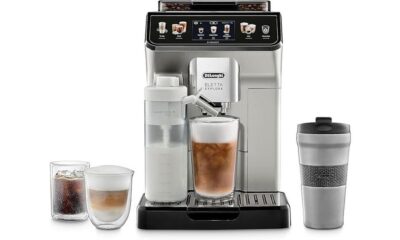
 Espresso Machines Reviews2 weeks ago
Espresso Machines Reviews2 weeks agoDeLonghi Eletta Explore: A Comprehensive Review [2025]
-

 Espresso Machines Reviews3 weeks ago
Espresso Machines Reviews3 weeks agoILAVIE 20 Bar Espresso Machine Review (2025)
-

 Espresso Machines Reviews3 weeks ago
Espresso Machines Reviews3 weeks agoSUMSATY Espresso Machine Review (2025)
-
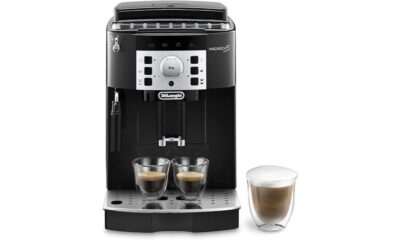
 Espresso Machines Reviews2 weeks ago
Espresso Machines Reviews2 weeks agoDeLonghi Magnifica S ECAM22.110.B Review: A Coffee Lover's Dream [2025]
-
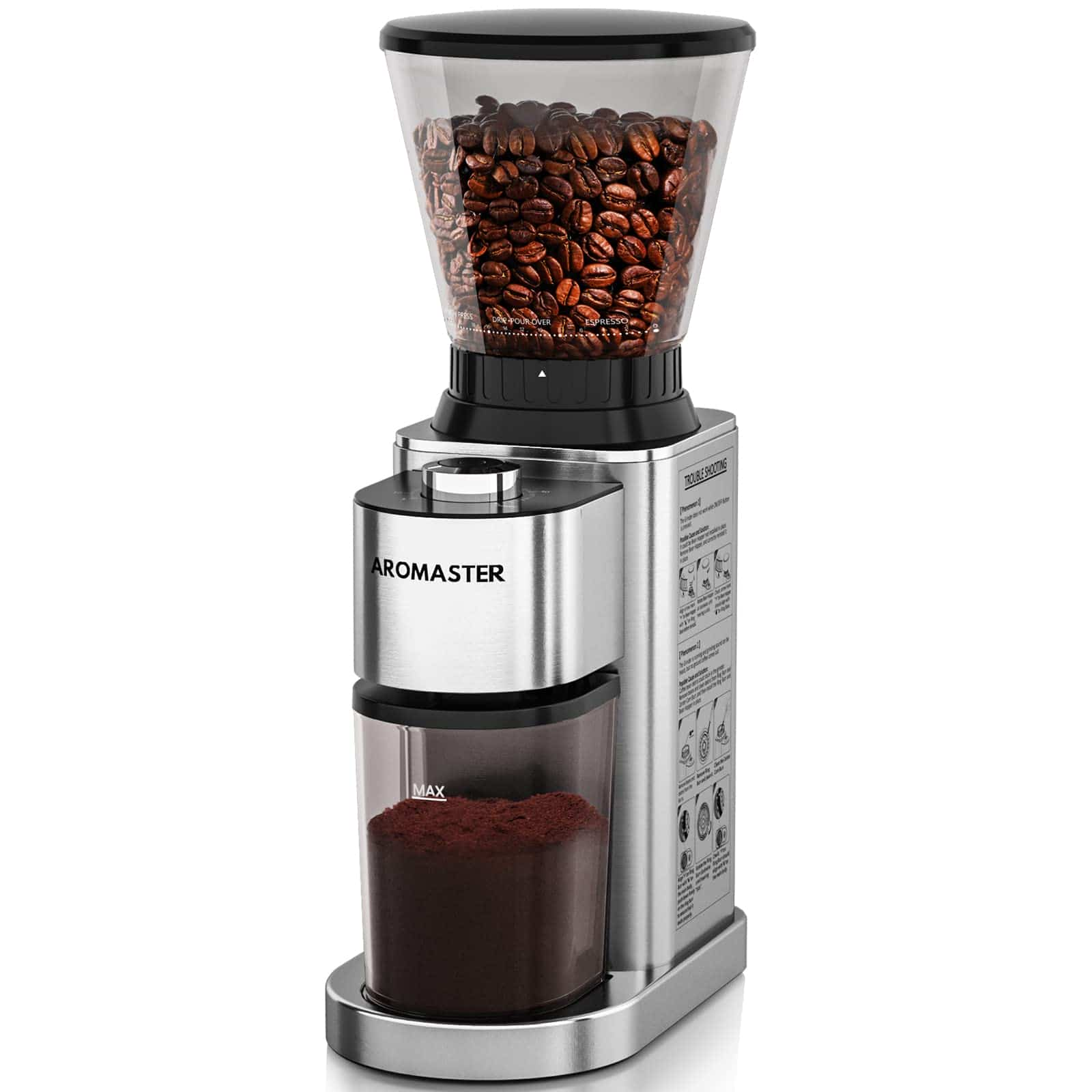
 Coffee Grinders Reviews3 weeks ago
Coffee Grinders Reviews3 weeks agoAromaster Burr Coffee Grinder Review (2025)
-

 Espresso Machines Reviews3 weeks ago
Espresso Machines Reviews3 weeks agoMAttinata Espresso Machine Review (2025)
-
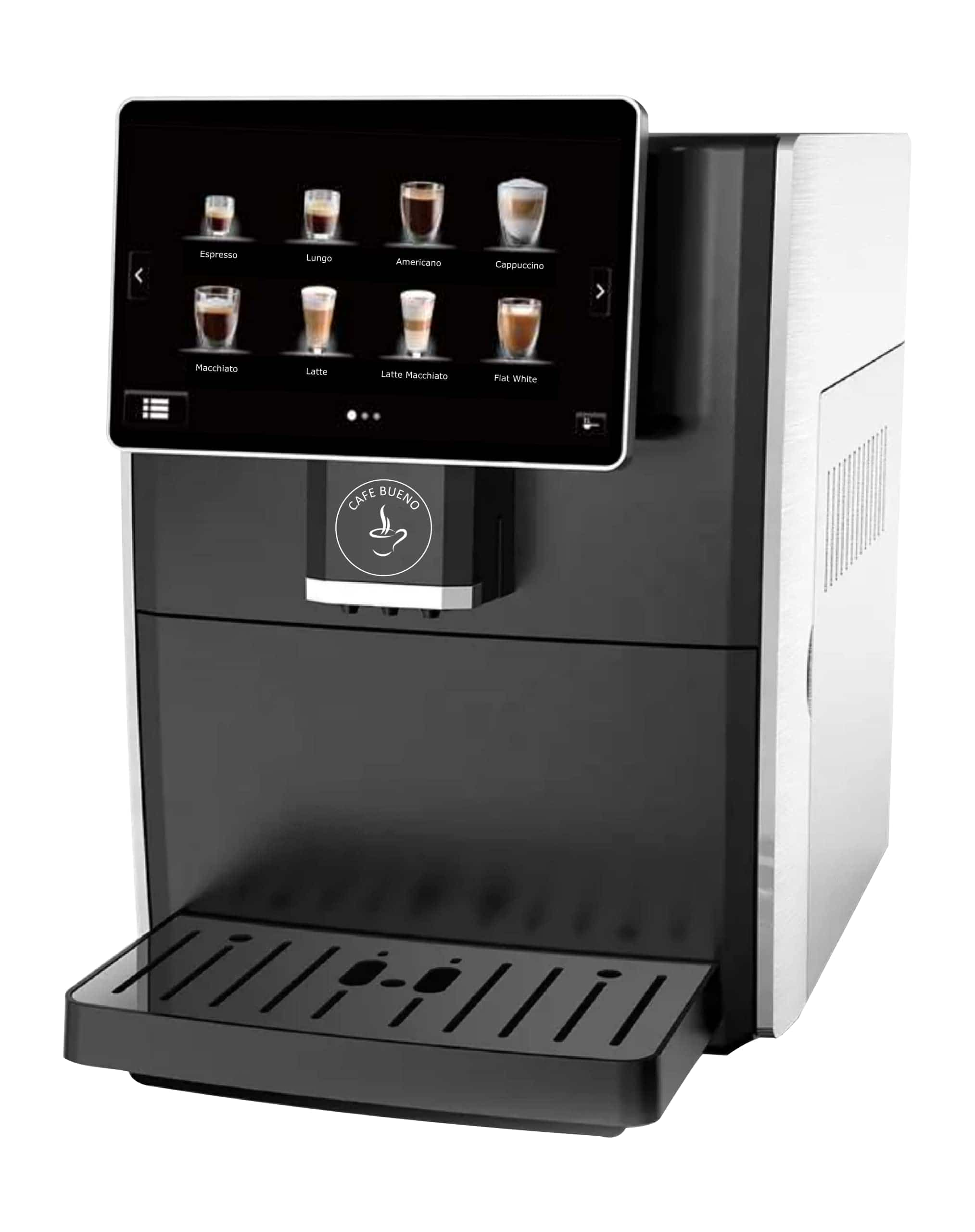
 Espresso Machines Reviews3 weeks ago
Espresso Machines Reviews3 weeks agoCafe Bueno Super Automatic Espresso Machine Review (2025)
-
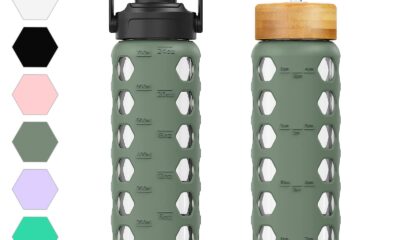
 Cappuccino Oracle Selected Reviews2 weeks ago
Cappuccino Oracle Selected Reviews2 weeks agoBest Glass Water Bottles for Eco-Friendly Hydration [2025]







